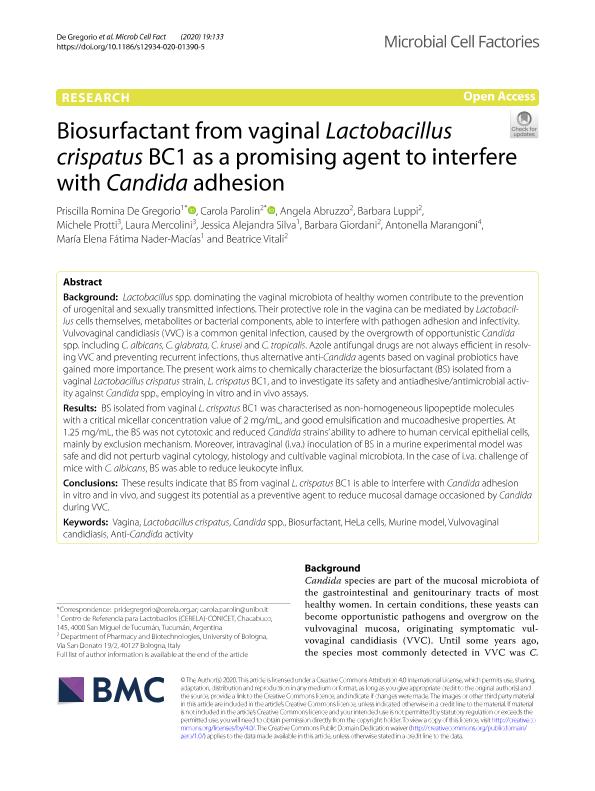Artículo
Biosurfactant from vaginal Lactobacillus crispatus BC1 as a promising agent to interfere with Candida adhesion
de Gregorio, Priscilla Romina ; Parolin, Carola; Abruzzo, Angela; Luppi, Barbara; Protti, Michele; Mercolini, Laura; Silva, Jessica Alejandra
; Parolin, Carola; Abruzzo, Angela; Luppi, Barbara; Protti, Michele; Mercolini, Laura; Silva, Jessica Alejandra ; Giordani, Barbara; Marangoni, Antonella; Nader, Maria Elena Fatima
; Giordani, Barbara; Marangoni, Antonella; Nader, Maria Elena Fatima ; Vitali, Beatrice
; Vitali, Beatrice
 ; Parolin, Carola; Abruzzo, Angela; Luppi, Barbara; Protti, Michele; Mercolini, Laura; Silva, Jessica Alejandra
; Parolin, Carola; Abruzzo, Angela; Luppi, Barbara; Protti, Michele; Mercolini, Laura; Silva, Jessica Alejandra ; Giordani, Barbara; Marangoni, Antonella; Nader, Maria Elena Fatima
; Giordani, Barbara; Marangoni, Antonella; Nader, Maria Elena Fatima ; Vitali, Beatrice
; Vitali, Beatrice
Fecha de publicación:
18/06/2020
Editorial:
BioMed Central
Revista:
Microbial Cell Factories
ISSN:
1475-2859
Idioma:
Inglés
Tipo de recurso:
Artículo publicado
Clasificación temática:
Resumen
Lactobacillus spp. dominating the vaginal microbiota of healthy women contribute to the prevention of urogenital and sexually transmitted infections. Their protective role in the vagina can be mediated by Lactobacillus cells themselves, metabolites or bacterial components, able to interfere with pathogen adhesion and infectivity. Vulvovaginal candidiasis (VVC) is a common genital infection, caused by the overgrowth of opportunistic Candida spp. including C. albicans, C. glabrata, C. krusei and C. tropicalis. Azole antifungal drugs are not always efcient in resolv ing VVC and preventing recurrent infections, thus alternative anti-Candida agents based on vaginal probiotics have gained more importance. The present work aims to chemically characterize the biosurfactant (BS) isolated from a vaginal Lactobacillus crispatus strain, L. crispatus BC1, and to investigate its safety and antiadhesive/antimicrobial activ ity against Candida spp., employing in vitro and in vivo assays. Results: BS isolated from vaginal L. crispatus BC1 was characterised as non-homogeneous lipopeptide molecules with a critical micellar concentration value of 2 mg/mL, and good emulsifcation and mucoadhesive properties. At 1.25 mg/mL, the BS was not cytotoxic and reduced Candida strains? ability to adhere to human cervical epithelial cells, mainly by exclusion mechanism. Moreover, intravaginal (i.va.) inoculation of BS in a murine experimental model was safe and did not perturb vaginal cytology, histology and cultivable vaginal microbiota. In the case of i.va. challenge of mice with C. albicans, BS was able to reduce leukocyte infux. Conclusions: These results indicate that BS from vaginal L. crispatus BC1 is able to interfere with Candida adhesion in vitro and in vivo, and suggest its potential as a preventive agent to reduce mucosal damage occasioned by Candida during VVC.
Archivos asociados
Licencia
Identificadores
Colecciones
Articulos(CERELA)
Articulos de CENTRO DE REFERENCIA PARA LACTOBACILOS (I)
Articulos de CENTRO DE REFERENCIA PARA LACTOBACILOS (I)
Citación
de Gregorio, Priscilla Romina; Parolin, Carola; Abruzzo, Angela; Luppi, Barbara; Protti, Michele; et al.; Biosurfactant from vaginal Lactobacillus crispatus BC1 as a promising agent to interfere with Candida adhesion; BioMed Central; Microbial Cell Factories; 19; 133; 18-6-2020; 1-16
Compartir
Altmétricas



